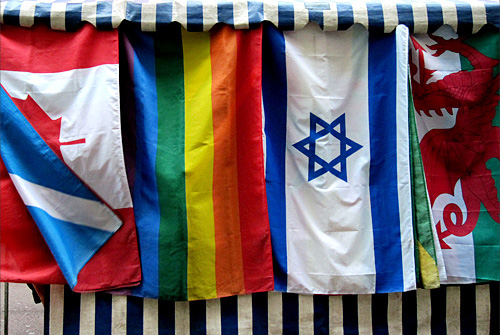Gays as a nation?
In many countries liberalization of legislation towards gay people led to an emergence of a living subculture while social equality has never been fully achieved. Following this natural tendency of every minority group, gay people and other representatives of LGBT community are looking for protection and support among their own kind. This leads to growth of frustration and wish to separate from apparently hostile heterosexual majority. A long history of stigmatization and discrimination of the LGBT community resulted that many gays and lesbians began to perceive themselves as the people significantly different from heterosexuals.
In 1990 it caused an emergence of the concept of gay nationalism (or queer nationalism). Gay nationalists claim that the LGBT community – it's not a group of people with specific sexual practices, but a nation, which has its own identity, culture and history.
One of the arguments to support such position is that the Universal Declaration of Human Rights contains Article 15, which guarantees the right to free choice of nationality, and Article 16, which guarantees right to marriage, regardless of ethnicity.
Another argument could be the fact that the gay community shares many features necessary to form a nation: their own culture, literature, press, festivals, theaters, clubs, movies etc. Gays connected by a common historical fate and are looking for access to the tools state regulation in order to ensure their own safety. At the same time the LGBT community is mostly politically organized and – to some extent – seeks to awaken of national feelings.

It worth noting that not only representatives of the heterosexual majority, but also many members of the gay community itself are being highly critical of this concept. In their opinion, sexual orientation can not be the basis of national identity. Many gays and lesbians are patriots of their own country and their nation and do not see why they should unite with the foreign "colleagues" on the grounds of sexual orientation. Gay nationalists, in their turn, suggest that integration into the society, proposed by their opponents, is basically assimilation and denial of their own culture, implying that homosexuals have to adjust to the mainstream culture of the majority. Such an argument is highly controversial, since the same person can be both a proud representative of their nationality and an activist of the LGBT community life.
The concept of gay nationalism is one of the steps to the acquisition of an identity: some may find it appropriate while some will not. The main task of any social theory is to provide people an opportunity to coexist with others. It is highly unlikely that the idea of queer nationalism will become dominant, however even now it helps its supporters to feel like their "belong to the pack".
Автор: Gay Alliance Ukraine

